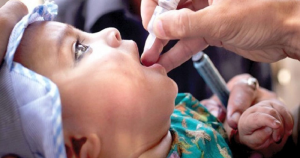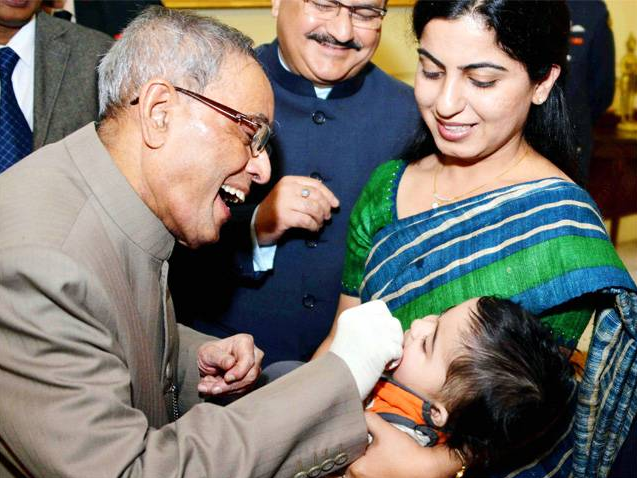
India To switch From Trivalent Oral Polio Vaccine To Bivalent Oral Polio Vaccine
New Delhi: President Pranab Mukherjee today launched the Pulse Polio programme for 2016 by administering polio drops to children less than five years old, at the Rahstrapati Bhawan, in the presence of the Union Health Minister JP Nadda on the eve of National Immunisation Day. With India remaining polio free for five years now, the government said that it plans to switch to bivalent Oral Polio Vaccine (bOPV) from its present trivalent version (tOPV) in “some months.”

Speaking at the function, J P Nadda said Polio-free status for five years is a treasure for all of us. India has been now validated for Maternal and Neonatal Tetanus elimination in May 2015, well before the global target date of December 2015. This is a monumental achievement in the country’s efforts to achieve universal health care and address health inequities.”
The Health Minister mentioned that in a landmark step to provide double protection to our children and securing our gains of polio eradication, Government of India has introduced the injectable Inactivated Polio Vaccine (IPV) into its routine immunization program along with oral polio vaccine from 30 November 2015. In the first phase IPV has been introduced in six States, viz Assam, Gujarat, Punjab, Bihar, Madhya Pradesh, and Uttar Pradesh.
The minister also added, “We are also planning for switch from trivalent OPV to bivalent OPV in some months in a globally synchronized manner.”
Trivalent OPV contains live and weakened versions for all the three types (1, 2 and 3) of wild polio while the bivalent vaccine will contain type 1 and 3. Type 2 of wild polio virus has been eradicated worldwide long time back.
IPV and OPV together can provide additional protection to a child. The last polio case was reported in India in 2011. India was certified polio-free on 27 March 2014, but the immunization programme continues since two of its neighbors (Pakistan and Afghanistan) remain polio-endemic and due to the threat of vaccine-derived polio. Since 2009, India has witnessed 41 cases of Vaccine-derived poliovirus (VDPV), including two such cases in 2014.
“In order to mitigate the risk of importation, the immunity against polio infection is maintained through National and Sub National Polio rounds along with sustained high quality polio surveillance. We are vigilant and that is the reason we are conducting continuous polio vaccination at the international borders with India,” the Health Minister said.
He said a travel advisory has also been issued as per WHO guidelines to vaccinate all travellers who are travelling between India and eight other countries — Pakistan, Nigeria, Afghanistan, Cameroon, Syria, Ethiopia, Somalia and Kenya, adding, an Emergency Preparedness and Response Plan (EPRP) is in place under which Rapid Response Teams (RRT) have been formed in all states and UTs to respond urgently to any importations of polio virus.
The Union Health Minister also applauded efforts of the thousands of volunteers, frontline workers, and health officials across the states and development partners for their efforts in keeping the country polio-free.
Type 3 virus would be removed from the vaccine as next step because not a single case of this virus had been reported from anywhere in the world during the past two years. By 2020 OPV will be completely stopped and only Inactivated Polio Vaccine, which is a dead virus, will be used all over the world.
Around 17.4 crore children of less than five years across the country will be given polio drops as part of the drive of Government of India to sustain polio eradication from the country — PTI